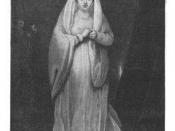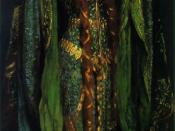A final point worth noting is Macbeth's reported inability to answer "Amen" to a solemn prayer to God. Shakespeare's post-medieval world still strictly adhered to the binary opposition between the divine and the occult, or to put it in more ecclesiastic terms, between Christ and Satan. The belief went that Satanic forces would not, or could not pay homage to Christ. Thus, Macbeth's inability to answer "Amen" reflects his debasement, sinking to the ranks of the witches and joining his wife there (recall her prayer to "spirits" in I.v.40).
More specifically, James, king of England, was in competition with the king of Scotland at the time, and let us not fail to notice that this play takes place in Scotland, the troubled country of the north. This Scottish trouble due to riotous kingdoms is meant in due contrast to James's legitimate, peaceful and just England. As this play was seen by the masses in Shakespeare's Globe Theater, this was excellent "PR" for James.
It was written for his new patron, James I (James VI of Scotland), following the death of Queen Elizabeth. James was interested in witchcraft and Scotland, and hence the themes in the play. Banquo is James's ancestor. The play itself tells the story of a man, urged by his wife and foretold by prophecy, who commits regicide in order to gain power. Unfortunately, due to numerous quirks of language and obscure allusions, the play is difficult to understand without assistance. Using this annotated version along with external links and analysis, to more information, you can now get a better grasp of one the best tragedies ever written, the tale of Macbeth.
At this moment she thinks she hears something and says, "Hark! Peace! / It was the owl that shriek'd, the fatal bellman, / Which gives the stern'st good-night. He is about it" (2.2.2-4). A lot happens in these few words. When she says "Hark!" she's telling herself to listen, and then when she says "Peace!" she's telling herself to be quiet, so that she can hear what she's listening for. After she listens, she decides that she heard a screech owl, and she takes that as a good omen, because the screech owl is nature's own "fatal bellman." A "fatal bellman" is a night watchman who rings a bell at the door of a prisoner scheduled for execution in the morning, and an owl does the same job in nature, because--according to folklore--the screech of a screech owl foretells the death of a person. Therefore, Lady Macbeth believes that because she has just heard the owl's screech, her husband must be "about it," that is, doing it (the murder) at this very moment.
Characteristics shown by Lady Macbeth that develop later in the play.
Lady Macbeth - Wife to Macbeth and his primary motivator. A childless woman, from the start of the play she turns feverish at the prospect of becoming queen and declares that she would kill her own child--"dash his brains out"--if it helped her achieve this (I.vii.55). This connection between childlessness and power has led critics, prominently AC Knight in his famous essay How Many Children Had Lady Macbeth?, to remark that this is part of the play's greater symbolism, where evil is infertile and good is fertile. Note also the Macbeth couple's frequent mentioning of and appearances in "a heath" or "a wasteland," places where crops do not grow.
Noteworthy is Lady Macbeth's development of conscience throughout the play. While in the first four acts there is none to speak of (she is even more ruthless than her husband), suddenly she begins to have pangs of guilt, such as in the famous scene where she attempts to wash her hands of blood (V.i.34). She begins to have frequent bouts of sleeptalking and sleepwalking, where the terror of her conscience expresses itself. Dying an apparent suicide, Lady Macbeth kills herself out of guilt.
Finally, it is important to note the contrast between Lady Macbeth's flowing and articulate speeches convincing her husband to "do the deed" with her own inclination to inaction. In the only scene where she is even in a position to do anything of importance, she backs out because of the sentimental excuse that the victim's sleeping body reminded her of her father as he slept (II.ii.13). Then she makes her husband do it.
Noteworthy is Lady Macbeth's development of conscience throughout the play. While in the first four acts there is none to speak of (she is even more ruthless than her husband), suddenly she begins to have pangs of guilt, such as in the famous scene where she attempts to wash her hands of blood (V.i.34). She begins to have frequent bouts of sleeptalking and sleepwalking, where the terror of her conscience expresses itself. Dying an apparent suicide, Lady Macbeth kills herself out of guilt.
Finally, it is important to note the contrast between Lady Macbeth's flowing and articulate speeches convincing her husband to "do the deed" with her own inclination to inaction. In the only scene where she is even in a position to do anything of importance, she backs out because of the sentimental excuse that the victim's sleeping body reminded her of her father as he slept (II.ii.13). Then she makes her husband do it.
, "Why, worthy thane, / You do unbend your noble strength, to think / So brainsickly of things" (2.2.41-43). She tells him to "Go get some water, / And wash this filthy witness from your hand" (2.2.43-44). The "filthy witness" is the blood of Duncan, which acts as a witness to Macbeth's crime, but as Lady Macbeth is saying this, she sees another "witness": Macbeth is still carrying the grooms' daggers! She tells him he must take the daggers back, put them with the grooms, and smear the grooms with blood, so it will look like the grooms killed the King.
She takes the daggers from him and tells him that it's childish to be afraid of the sleeping or the dead. And she's not afraid of blood, either. She says, "If he [King Duncan] do bleed, / I'll gild the faces of the grooms withal / For it must seem their guilt" (2.2.52-54)





